31/1/18 Wednesday of the Fourth week in Ordinary Time
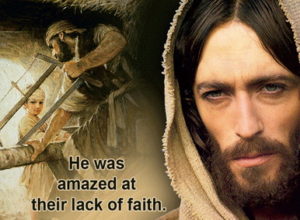 First Redaing 2nd book of Samuel 24:2.9-17.
First Redaing 2nd book of Samuel 24:2.9-17.
King David said to Joab and the leaders of the army who were with him, “Tour all the tribes in Israel from Dan to Beer-sheba and register the people, that I may know their number.”
Joab then reported to the king the number of people registered: in Israel, eight hundred thousand men fit for military service; in Judah, five hundred thousand.
Afterward, however, David regretted having numbered the people, and said to the LORD: “I have sinned grievously in what I have done. But now, LORD, forgive the guilt of your servant, for I have been very foolish.”
When David rose in the morning, the LORD had spoken to the prophet Gad, David’s seer, saying:
“Go and say to David, ‘This is what the LORD says: I offer you three alternatives; choose one of them, and I will inflict it on you.'”
Gad then went to David to inform him. He asked: “Do you want a three years’ famine to come upon your land, or to flee from your enemy three months while he pursues you, or to have a three days’ pestilence in your land? Now consider and decide what I must reply to him who sent me.”
David answered Gad: “I am in very serious difficulty. Let us fall by the hand of God, for he is most merciful; but let me not fall by the hand of man.”
Thus David chose the pestilence. Now it was the time of the wheat harvest when the plague broke out among the people. (The LORD then sent a pestilence over Israel from morning until the time appointed, and seventy thousand of the people from Dan to Beer-sheba died.)
But when the angel stretched forth his hand toward Jerusalem to destroy it, the LORD regretted the calamity and said to the angel causing the destruction among the people, “Enough now! Stay your hand.” The angel of the LORD was then standing at the threshing floor of Araunah the Jebusite.
When David saw the angel who was striking the people, he said to the LORD: “It is I who have sinned; it is I, the shepherd, who have done wrong. But these are sheep; what have they done? Punish me and my kindred.”
Gospel Mark 6:1-6.
Jesus departed from there and came to his native place, accompanied by his disciples.
When the sabbath came he began to teach in the synagogue, and many who heard him were astonished. They said, “Where did this man get all this? What kind of wisdom has been given him? What mighty deeds are wrought by his hands! Is he not the carpenter, the son of Mary, and the brother of James and Joses and Judas and Simon? And are not his sisters here with us?” And they took offense at him.
Jesus said to them, “A prophet is not without honor except in his native place and among his own kin and in his own house.” So he was not able to perform any mighty deed there, apart from curing a few sick people by laying his hands on them.
30/1/18 Tuesday of the Fourth week in Ordinary Time
 First Reading 2nd book of Samuel 18:9-10.14b.24-25a.30-32.19:1-3.
First Reading 2nd book of Samuel 18:9-10.14b.24-25a.30-32.19:1-3.
Absalom unexpectedly came up against David’s servants. He was mounted on a mule, and, as the mule passed under the branches of a large terebinth, his hair caught fast in the tree. He hung between heaven and earth while the mule he had been riding ran off.
Someone saw this and reported to Joab that he had seen Absalom hanging from a terebinth.
Joab replied, “I will not waste time with you in this way.” And taking three pikes in hand, he thrust for the heart of Absalom, still hanging from the tree alive.
Now David was sitting between the two gates, and a lookout mounted to the roof of the gate above the city wall, where he looked about and saw a man running all alone.
The lookout shouted to inform the king, who said, “If he is alone, he has good news to report.” As he kept coming nearer,
The king said, “Step aside and remain in attendance here.” So he stepped aside and remained there.
When the Cushite came in, he said, “Let my lord the king receive the good news that this day the LORD has taken your part, freeing you from the grasp of all who rebelled against you.”
But the king asked the Cushite, “Is young Absalom safe?” The Cushite replied, “May the enemies of my lord the king and all who rebel against you with evil intent be as that young man!”
The king was shaken, and went up to the room over the city gate to weep. He said as he wept, “My son Absalom! My son, my son Absalom! If only I had died instead of you, Absalom, my son, my son!”
Joab was told that the king was weeping and mourning for Absalom;
and that day’s victory was turned into mourning for the whole army when they heard that the king was grieving for his son.
Gospel Mark 5:21-43.
When Jesus had crossed again in the boat to the other side, a large crowd gathered around him, and he stayed close to the sea.
One of the synagogue officials, named Jairus, came forward. Seeing him he fell at his feet
and pleaded earnestly with him, saying, “My daughter is at the point of death. Please, come lay your hands on her that she may get well and live.”
He went off with him, and a large crowd followed him and pressed upon him.
There was a woman afflicted with hemorrhages for twelve years.
She had suffered greatly at the hands of many doctors and had spent all that she had. Yet she was not helped but only grew worse. She had heard about Jesus and came up behind him in the crowd and touched his cloak. She said, “If I but touch his clothes, I shall be cured.”
Immediately her flow of blood dried up. She felt in her body that she was healed of her affliction.
Jesus, aware at once that power had gone out from him, turned around in the crowd and asked, “Who has touched my clothes?” But his disciples said to him, “You see how the crowd is pressing upon you, and yet you ask, ‘Who touched me?'” And he looked around to see who had done it.
The woman, realizing what had happened to her, approached in fear and trembling. She fell down before Jesus and told him the whole truth.
He said to her, “Daughter, your faith has saved you. Go in peace and be cured of your affliction.”
While he was still speaking, people from the synagogue official’s house arrived and said, “Your daughter has died; why trouble the teacher any longer?”
Disregarding the message that was reported, Jesus said to the synagogue official, “Do not be afraid; just have faith.” He did not allow anyone to accompany him inside except Peter, James, and John, the brother of James. When they arrived at the house of the synagogue official, he caught sight of a commotion, people weeping and wailing loudly.
So he went in and said to them, “Why this commotion and weeping? The child is not dead but asleep.”
And they ridiculed him. Then he put them all out. He took along the child’s father and mother and those who were with him and entered the room where the child was.
He took the child by the hand and said to her, “Talitha koum,” which means, “Little girl, I say to you, arise!”
The girl, a child of twelve, arose immediately and walked around. (At that) they were utterly astounded.
He gave strict orders that no one should know this and said that she should be given something to eat.
29/1/18 Monday of the Fourth week in Ordinary Time
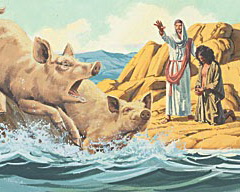 First Reading 2nd book of Samuel 15:13-14.30.16:5-13a.
First Reading 2nd book of Samuel 15:13-14.30.16:5-13a.
An informant came to David with the report, “The children of Israel have transferred their loyalty to Absalom.”
At this, David said to all his servants who were with him in Jerusalem: “Up! Let us take flight, or none of us will escape from Absalom. Leave quickly, lest he hurry and overtake us, then visit disaster upon us and put the city to the sword.” As David went up the Mount of Olives, he wept without ceasing. His head was covered, and he was walking barefoot. All those who were with him also had their heads covered and were weeping as they went. As David was approaching Bahurim, a man named Shimei, the son of Gera of the same clan as Saul’s family, was coming out of the place, cursing as he came.
He threw stones at David and at all the king’s officers, even though all the soldiers, including the royal guard, were on David’s right and on his left.
Shimei was saying as he cursed: “Away, away, you murderous and wicked man!
The LORD has requited you for all the bloodshed in the family of Saul, in whose stead you became king, and the LORD has given over the kingdom to your son Absalom. And now you suffer ruin because you are a murderer.”
Abishai, son of Zeruiah, said to the king: “Why should this dead dog curse my lord the king? Let me go over, please, and lop off his head.” But the king replied: “What business is it of mine or of yours, sons of Zeruiah, that he curses? Suppose the LORD has told him to curse David; who then will dare to say, ‘Why are you doing this?'”
Then the king said to Abishai and to all his servants: “If my own son, who came forth from my loins, is seeking my life, how much more might this Benjaminite do so! Let him alone and let him curse, for the LORD has told him to. Perhaps the LORD will look upon my affliction and make it up to me with benefits for the curses he is uttering this day.”
David and his men continued on the road, while Shimei kept abreast of them on the hillside, all the while cursing and throwing stones and dirt as he went.
Gospel Mark 5:1-20.
Jesus and his disciples came to the other side of the sea, to the territory of the Gerasenes.
When he got out of the boat, at once a man from the tombs who had an unclean spirit met him.
The man had been dwelling among the tombs, and no one could restrain him any longer, even with a chain.
In fact, he had frequently been bound with shackles and chains, but the chains had been pulled apart by him and the shackles smashed, and no one was strong enough to subdue him.
Night and day among the tombs and on the hillsides he was always crying out and bruising himself with stones.
Catching sight of Jesus from a distance, he ran up and prostrated himself before him,
crying out in a loud voice, “What have you to do with me, Jesus, Son of the Most High God? I adjure you by God, do not torment me!” (He had been saying to him, “Unclean spirit, come out of the man!”)
He asked him, “What is your name?” He replied, “Legion is my name. There are many of us.”
And he pleaded earnestly with him not to drive them away from that territory.
Now a large herd of swine was feeding there on the hillside.
And they pleaded with him, “Send us into the swine. Let us enter them.”
And he let them, and the unclean spirits came out and entered the swine. The herd of about two thousand rushed down a steep bank into the sea, where they were drowned.
The swineherds ran away and reported the incident in the town and throughout the countryside. And people came out to see what had happened.
As they approached Jesus, they caught sight of the man who had been possessed by Legion, sitting there clothed and in his right mind. And they were seized with fear.
Those who witnessed the incident explained to them what had happened to the possessed man and to the swine. Then they began to beg him to leave their district.
As he was getting into the boat, the man who had been possessed pleaded to remain with him.
But he would not permit him but told him instead, “Go home to your family and announce to them all that the Lord in his pity has done for you.” Then the man went off and began to proclaim in the Decapolis what Jesus had done for him; and all were amazed.
28/1/18 Fourth Sunday in Ordinary Time
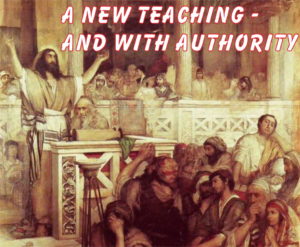
First Reading Deuteronomy 18:15-20.
Moses spoke to all the people, saying: “A prophet like me will the LORD, your God, raise up for you from among your own kin; to him you shall listen.
This is exactly what you requested of the LORD, your God, at Horeb on the day of the assembly, when you said, ‘Let us not again hear the voice of the LORD, our God, nor see this great fire any more, lest we die.’
And the LORD said to me, ‘This was well said.
I will raise up for them a prophet like you from among their kinsmen, and will put my words into his mouth; he shall tell them all that I command him.
If any man will not listen to my words which he speaks in my name, I myself will make him answer for it.
But if a prophet presumes to speak in my name an oracle that I have not commanded him to speak, or speaks in the name of other gods, he shall die.’
Second Reading First Letter to the Corinthians 7:32-35.
Brothers and sisters: I should like you to be free of anxieties. An unmarried man is anxious about the things of the Lord, how he may please the Lord.
But a married man is anxious about the things of the world, how he may please his wife,
and he is divided. An unmarried woman or a virgin is anxious about the things of the Lord, so that she may be holy in both body and spirit. A married woman, on the other hand, is anxious about the things of the world, how she may please her husband.
I am telling you this for your own benefit, not to impose a restraint upon you, but for the sake of propriety and adherence to the Lord without distraction.
Jesus came to Capernaum with his followers, and on the sabbath he entered the synagogue and taught.
The people were astonished at his teaching, for he taught them as one having authority and not as the scribes.
In their synagogue was a man with an unclean spirit;
he cried out, “What have you to do with us, Jesus of Nazareth? Have you come to destroy us? I know who you are–the Holy One of God!”
Jesus rebuked him and said, “Quiet! Come out of him!”
The unclean spirit convulsed him and with a loud cry came out of him.
All were amazed and asked one another, “What is this? A new teaching with authority. He commands even the unclean spirits and they obey him.”
His fame spread everywhere throughout the whole region of Galilee.
27/1/18 Saturday of the Third week in Ordinary Time
 First Reading 2nd book of Samuel 12:1-7a.10-17.
First Reading 2nd book of Samuel 12:1-7a.10-17.
The LORD sent Nathan to David, and when he came to him, Nathan said: “Judge this case for me! In a certain town there were two men, one rich, the other poor. The rich man had flocks and herds in great numbers.
But the poor man had nothing at all except one little ewe lamb that he had bought. He nourished her, and she grew up with him and his children. She shared the little food he had and drank from his cup and slept in his bosom. She was like a daughter to him.
Now, the rich man received a visitor, but he would not take from his own flocks and herds to prepare a meal for the wayfarer who had come to him. Instead he took the poor man’s ewe lamb and made a meal of it for his visitor.” David grew very angry with that man and said to Nathan: “As the LORD lives, the man who has done this merits death! He shall restore the ewe lamb fourfold because he has done this and has had no pity.” Then Nathan said to David: “You are the man! Thus says the LORD God of Israel:
Now, therefore, the sword shall never depart from your house, because you have despised me and have taken the wife of Uriah to be your wife.’
Thus says the LORD: ‘I will bring evil upon you out of your own house. I will take your wives while you live to see it, and will give them to your neighbor. He shall lie with your wives in broad daylight.
You have done this deed in secret, but I will bring it about in the presence of all Israel, and with the sun looking down.'” Then David said to Nathan, “I have sinned against the LORD.” Nathan answered David: “The LORD on his part has forgiven your sin: you shall not die.
But since you have utterly spurned the LORD by this deed, the child born to you must surely die.”
Then Nathan returned to his house. The LORD struck the child that the wife of Uriah had borne to David, and it became desperately ill. David besought God for the child. He kept a fast, retiring for the night to lie on the ground clothed in sackcloth. The elders of his house stood beside him urging him to rise from the ground; but he would not, nor would he take food with them.
Gospel Mark 4:35-41.
On that day, as evening drew on, Jesus said to his disciples: “Let us cross to the other side.”
Leaving the crowd, they took him with them in the boat just as he was. And other boats were with him.
A violent squall came up and waves were breaking over the boat, so that it was already filling up.
Jesus was in the stern, asleep on a cushion. They woke him and said to him, “Teacher, do you not care that we are perishing?”
He woke up, rebuked the wind, and said to the sea, “Quiet! Be still!” The wind ceased and there was great calm.Then he asked them, “Why are you terrified? Do you not yet have faith?”
They were filled with great awe and said to one another, “Who then is this whom even wind and sea obey?”
26/1/18 Saints Timothy and Titus, bishops – Memorial
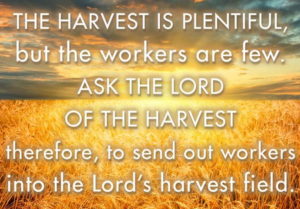
First Reading Second Letter to Timothy 1:1-8.
Paul, an apostle of Christ Jesus by the will of God for the promise of life in Christ Jesus,
to Timothy, my dear child: grace, mercy, and peace from God the Father and Christ Jesus our Lord.
I am grateful to God, whom I worship with a clear conscience as my ancestors did, as I remember you constantly in my prayers, night and day.
I yearn to see you again, recalling your tears, so that I may be filled with joy,
as I recall your sincere faith that first lived in your grandmother Lois and in your mother Eunice and that I am confident lives also in you.
For this reason, I remind you to stir into flame the gift of God that you have through the imposition of my hands.
For God did not give us a spirit of cowardice but rather of power and love and self-control.
So do not be ashamed of your testimony to our Lord, nor of me, a prisoner for his sake; but bear your share of hardship for the gospel with the strength that comes from God.
Gospel Luke 10:1-9.
The Lord Jesus appointed seventy-two others whom he sent ahead of him in pairs to every town and place he intended to visit.
He said to them, “The harvest is abundant but the laborers are few; so ask the master of the harvest to send out laborers for his harvest.
Go on your way; behold, I am sending you like lambs among wolves.
Carry no money bag, no sack, no sandals; and greet no one along the way.
Into whatever house you enter, first say, ‘Peace to this household.’
If a peaceful person lives there, your peace will rest on him; but if not, it will return to you.
Stay in the same house and eat and drink what is offered to you, for the laborer deserves his payment. Do not move about from one house to another.
Whatever town you enter and they welcome you, eat what is set before you,
cure the sick in it and say to them, ‘The kingdom of God is at hand for you.'”
25/1/18 Conversion of Saint Paul, apostle – Feast

First Reading Acts of the Apostles 22:3-16.
Paul addressed the people in these words: “I am a Jew, born in Tarsus in Cilicia, but brought up in this city. At the feet of Gamaliel I was educated strictly in our ancestral law and was zealous for God, just as all of you are today. I persecuted this Way to death, binding both men and women and delivering them to prison.
Even the high priest and the whole council of elders can testify on my behalf. For from them I even received letters to the brothers and set out for Damascus to bring back to Jerusalem in chains for punishment those there as well. “On that journey as I drew near to Damascus, about noon a great light from the sky suddenly shone around me. I fell to the ground and heard a voice saying to me, ‘Saul, Saul, why are you persecuting me?’ I replied, ‘Who are you, sir?’ And he said to me, ‘I am Jesus the Nazorean whom you are persecuting.’
My companions saw the light but did not hear the voice of the one who spoke to me.
I asked, ‘What shall I do, sir?’ The Lord answered me, ‘Get up and go into Damascus, and there you will be told about everything appointed for you to do.’ Since I could see nothing because of the brightness of that light, I was led by hand by my companions and entered Damascus.
“A certain Ananias, a devout observer of the law, and highly spoken of by all the Jews who lived there,
came to me and stood there and said, ‘Saul, my brother, regain your sight.’ And at that very moment I regained my sight and saw him. Then he said, ‘The God of our ancestors designated you to know his will, to see the Righteous One, and to hear the sound of his voice; for you will be his witness before all to what you have seen and heard. Now, why delay? Get up and have yourself baptized and your sins washed away, calling upon his name.’
Jesus said to the eleven: “Go into the whole world and proclaim the Gospel to every creature.
Whoever believes and is baptized will be saved; whoever does not believe will be condemned.
These signs will accompany those who believe: in my name they will drive out demons, they will speak new languages. They will pick up serpents (with their hands), and if they drink any deadly thing, it will not harm them. They will lay hands on the sick, and they will recover.”
24/1/18 Wednesday of the Third week in Ordinary Time
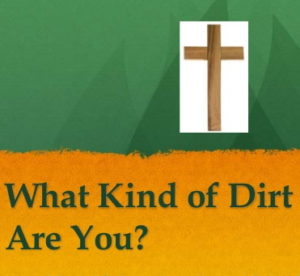 First Reading 2nd book of Samuel 7:4-17.
First Reading 2nd book of Samuel 7:4-17.
That night the LORD spoke to Nathan and said:
“Go, tell my servant David, ‘Thus says the LORD: Should you build me a house to dwell in?
I have not dwelt in a house from the day on which I led the Israelites out of Egypt to the present, but I have been going about in a tent under cloth.
In all my wanderings everywhere among the Israelites, did I ever utter a word to any one of the judges whom I charged to tend my people Israel, to ask: Why have you not built me a house of cedar?’
“Now then, speak thus to my servant David, ‘The LORD of hosts has this to say: It was I who took you from the pasture and from the care of the flock to be commander of my people Israel.
I have been with you wherever you went, and I have destroyed all your enemies before you. And I will make you famous like the great ones of the earth.
I will fix a place for my people Israel; I will plant them so that they may dwell in their place without further disturbance. Neither shall the wicked continue to afflict them as they did of old,
since the time I first appointed judges over my people Israel. I will give you rest from all your enemies. The LORD also reveals to you that he will establish a house for you.
And when your time comes and you rest with your ancestors, I will raise up your heir after you, sprung from your loins, and I will make his kingdom firm.
It is he who shall build a house for my name. And I will make his royal throne firm forever.
I will be a father to him, and he shall be a son to me. And if he does wrong, I will correct him with the rod of men and with human chastisements;
but I will not withdraw my favor from him as I withdrew it from your predecessor Saul, whom I removed from my presence.
Your house and your kingdom shall endure forever before me; your throne shall stand firm forever.'”
Nathan reported all these words and this entire vision to David.
On another occasion, Jesus began to teach by the sea. A very large crowd gathered around him so that he got into a boat on the sea and sat down. And the whole crowd was beside the sea on land.
And he taught them at length in parables, and in the course of his instruction he said to them,
Hear this! A sower went out to sow. And as he sowed, some seed fell on the path, and the birds came and ate it up. Other seed fell on rocky ground where it had little soil. It sprang up at once because the soil was not deep. And when the sun rose, it was scorched and it withered for lack of roots.
Some seed fell among thorns, and the thorns grew up and choked it and it produced no grain.
And some seed fell on rich soil and produced fruit. It came up and grew and yielded thirty, sixty, and a hundredfold.” He added, “Whoever has ears to hear ought to hear.” And when he was alone, those present along with the Twelve questioned him about the parables.
He answered them, “The mystery of the kingdom of God has been granted to you. But to those outside everything comes in parables, so that ‘they may look and see but not perceive, and hear and listen but not understand, in order that they may not be converted and be forgiven.'”
Jesus said to them, “Do you not understand this parable? Then how will you understand any of the parables?
The sower sows the word.
These are the ones on the path where the word is sown. As soon as they hear, Satan comes at once and takes away the word sown in them.
And these are the ones sown on rocky ground who, when they hear the word, receive it at once with joy.
But they have no root; they last only for a time. Then when tribulation or persecution comes because of the word, they quickly fall away.
Those sown among thorns are another sort. They are the people who hear the word,
but worldly anxiety, the lure of riches, and the craving for other things intrude and choke the word, and it bears no fruit. But those sown on rich soil are the ones who hear the word and accept it and bear fruit thirty and sixty and a hundredfold.”
23/1/18 Tuesday of the Third week in Ordinary Time
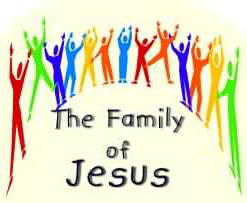
First Reading 2nd book of Samuel 6:12-15.17-19.
When it was reported to King David that the LORD had blessed the family of Obed-edom and all that belonged to him, David went to bring up the ark of God from the house of Obed-edom into the City of David amid festivities.
As soon as the bearers of the ark of the LORD had advanced six steps, he sacrificed an ox and a fatling.
Then David, girt with a linen apron, came dancing before the LORD with abandon,
as he and all the Israelites were bringing up the ark of the LORD with shouts of joy and to the sound of the horn.
The ark of the LORD was brought in and set in its place within the tent David had pitched for it. Then David offered holocausts and peace offerings before the LORD.
When he finished making these offerings, he blessed the people in the name of the LORD of hosts.
He then distributed among all the people, to each man and each woman in the entire multitude of Israel, a loaf of bread, a cut of roast meat, and a raisin cake. With this, all the people left for their homes.
The mother of Jesus and his brothers arrived at the house. Standing outside, they sent word to Jesus and called him.
A crowd seated around him told him, “Your mother and your brothers (and your sisters) are outside asking for you.”
But he said to them in reply, “Who are my mother and (my) brothers?”
And looking around at those seated in the circle he said, “Here are my mother and my brothers.
(For) whoever does the will of God is my brother and sister and mother.”
22/1/18 Monday of the Third week in Ordinary Time
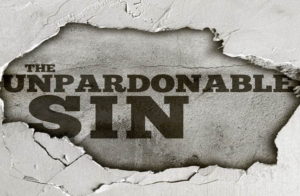
First Reading 2nd book of Samuel 5:1-7.10.
In those days, all the tribes of Israel came to David in Hebron and said: “Here we are, your bone and your flesh.
In days past, when Saul was our king, it was you who led the Israelites out and brought them back. And the LORD said to you, ‘You shall shepherd my people Israel and shall be commander of Israel.'”
When all the elders of Israel came to David in Hebron, King David made an agreement with them there before the LORD, and they anointed him king of Israel.
David was thirty years old when he became king, and he reigned for forty years:
seven years and six months in Hebron over Judah, and thirty-three years in Jerusalem over all Israel and Judah.
Then the king and his men set out for Jerusalem against the Jebusites who inhabited the region. David was told, “You cannot enter here: the blind and the lame will drive you away!” which was their way of saying, “David cannot enter here.”
But David did take the stronghold of Zion, which is the City of David.
David grew steadily more powerful, for the LORD of hosts was with him.
Gospel Mark 3:22-30.
The scribes who had come from Jerusalem said of Jesus, “He is possessed by Beelzebul,” and “By the prince of demons he drives out demons.”
Summoning them, he began to speak to them in parables, “How can Satan drive out Satan?
If a kingdom is divided against itself, that kingdom cannot stand.
And if a house is divided against itself, that house will not be able to stand.
And if Satan has risen up against himself and is divided, he cannot stand; that is the end of him.
But no one can enter a strong man’s house to plunder his property unless he first ties up the strong man. Then he can plunder his house.
Amen, I say to you, all sins and all blasphemies that people utter will be forgiven them.
But whoever blasphemes against the holy Spirit will never have forgiveness, but is guilty of an everlasting sin.”
21/1/18 Third Sunday in Ordinary Time
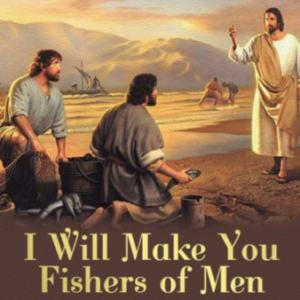 First Reading Book of Jonah 3:1-5.10.
First Reading Book of Jonah 3:1-5.10.
The word of the LORD came to Jonah a second time:
“Set out for the great city of Nineveh, and announce to it the message that I will tell you.”
So Jonah made ready and went to Nineveh, according to the LORD’S bidding. Now Nineveh was an enormously large city; it took three days to go through it.
Jonah began his journey through the city, and had gone but a single day’s walk announcing, “Forty days more and Nineveh shall be destroyed,”
when the people of Nineveh believed God; they proclaimed a fast and all of them, great and small, put on sackcloth.
When God saw by their actions how they turned from their evil way, he repented of the evil that he had threatened to do to them; he did not carry it out.
Second Reading First Letter to the Corinthians 7:29-31.
I tell you, brothers and sisters, the time is running out. From now on, let those having wives act as not having them,
those weeping as not weeping, those rejoicing as not rejoicing, those buying as not owning,
those using the world as not using it fully. For the world in its present form is passing away.
Gospel Mark 1:14-20.
After John had been arrested, Jesus came to Galilee proclaiming the Gospel of God:
“This is the time of fulfillment. The kingdom of God is at hand. Repent, and believe in the gospel.”
As he passed by the Sea of Galilee, he saw Simon and his brother Andrew casting their nets into the sea; they were fishermen.
Jesus said to them, “Come after me, and I will make you fishers of men.”
Then they abandoned their nets and followed him.
He walked along a little farther and saw James, the son of Zebedee, and his brother John. They too were in a boat mending their nets.
Then he called them. So they left their father Zebedee in the boat along with the hired men and followed him.
20/1/18 Saturday of the Second week in Ordinary Time
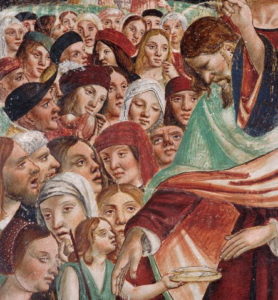 First reading 2nd book of Samuel 1:1-4.11-12.19.23-27.
First reading 2nd book of Samuel 1:1-4.11-12.19.23-27.
David returned from his defeat of the Amalekites and spent two days in Ziklag.
On the third day a man came from Saul’s camp, with his clothes torn and dirt on his head. Going to David, he fell to the ground in homage.
David asked him, “Where do you come from?” He replied, “I have escaped from the Israelite camp.”
“Tell me what happened,” David bade him. He answered that the soldiers had fled the battle and that many of them had fallen and were dead, among them Saul and his son Jonathan.
David seized his garments and rent them, and all the men who were with him did likewise.
They mourned and wept and fasted until evening for Saul and his son Jonathan, and for the soldiers of the LORD of the clans of Israel, because they had fallen by the sword. “Alas! the glory of Israel, Saul, slain upon your heights; how can the warriors have fallen! Saul and Jonathan, beloved and cherished, separated neither in life nor in death, swifter than eagles, stronger than lions! Women of Israel, weep over Saul, who clothed you in scarlet and in finery, who decked your attire with ornaments of gold. “How can the warriors have fallen– in the thick of the battle, slain upon your heights! “I grieve for you, Jonathan my brother! most dear have you been to me; More precious have I held love for you than love for women. “How can the warriors have fallen, the weapons of war have perished!”
Gospel Mark 3:20-21.
Jesus came with his disciples into the house. Again the crowd gathered, making it impossible for them even to eat.
When his relatives heard of this they set out to seize him, for they said, “He is out of his mind.”
19/1/18 Friday of the Second week in Ordinary Time
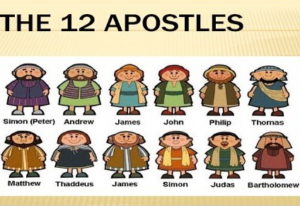 First Reading 1st book of Samuel 24:3-21.
First Reading 1st book of Samuel 24:3-21.
Saul took three thousand picked men from all Israel and went in search of David and his men in the direction of the wild goat crags.
When he came to the sheepfolds along the way, he found a cave, which he entered to ease nature. David and his men were occupying the inmost recesses of the cave.
David’s servants said to him, “This is the day of which the LORD said to you, ‘I will deliver your enemy into your grasp; do with him as you see fit.'” So David moved up and stealthily cut off an end of Saul’s mantle.
Afterward, however, David regretted that he had cut off an end of Saul’s mantle.
He said to his men, “The LORD forbid that I should do such a thing to my master, the LORD’S anointed, as to lay a hand on him, for he is the Lord’s anointed.”
With these words David restrained his men and would not permit them to attack Saul. Saul then left the cave and went on his way. David also stepped out of the cave, calling to Saul, “My lord the king!” When Saul looked back, David bowed to the ground in homage
and asked Saul: “Why do you listen to those who say, ‘David is trying to harm you’?
You see for yourself today that the LORD just now delivered you into my grasp in the cave. I had some thought of killing you, but I took pity on you instead. I decided, ‘I will not raise a hand against my lord, for he is the LORD’S anointed and a father to me.’ Look here at this end of your mantle which I hold. Since I cut off an end of your mantle and did not kill you, see and be convinced that I plan no harm and no rebellion. I have done you no wrong, though you are hunting me down to take my life.
The LORD will judge between me and you, and the LORD will exact justice from you in my case. I shall not touch you. The old proverb says, ‘From the wicked comes forth wickedness.’ So I will take no action against you. Against whom are you on campaign, O king of Israel? Whom are you pursuing? A dead dog, or a single flea! The LORD will be the judge; he will decide between me and you. May he see this, and take my part, and grant me justice beyond your reach!” When David finished saying these things to Saul, Saul answered, “Is that your voice, my son David?” And he wept aloud.
Saul then said to David: “You are in the right rather than I; you have treated me generously, while I have done you harm. Great is the generosity you showed me today, when the LORD delivered me into your grasp and you did not kill me. For if a man meets his enemy, does he send him away unharmed? May the LORD reward you generously for what you have done this day. And now, since I know that you shall surely be king and that sovereignty over Israel shall come into your possession.”
Gospel Mark 3:13-19.
Jesus went up the mountain and summoned those whom he wanted and they came to him.
He appointed twelve (whom he also named apostles) that they might be with him and he might send them forth to preach
and to have authority to drive out demons:
(he appointed the twelve:) Simon, whom he named Peter;
James, son of Zebedee, and John the brother of James, whom he named Boanerges, that is, sons of thunder;
Andrew, Philip, Bartholomew, Matthew, Thomas, James the son of Alphaeus; Thaddeus, Simon the Cananean,
and Judas Iscariot who betrayed him.
18/1/18 Thursday of the Second week in Ordinary Time

Firat Reading 1st book of Samuel 18:6-9.19:1-7.
When David and Saul approached (on David’s return after slaying the Philistine), women came out from each of the cities of Israel to meet King Saul, singing and dancing, with tambourines, joyful songs, and sistrums.
The women played and sang: “Saul has slain his thousands, and David his ten thousands.”
Saul was very angry and resentful of the song, for he thought: “They give David ten thousands, but only thousands to me. All that remains for him is the kingship.”
(And from that day on, Saul was jealous of David.
Saul discussed his intention of killing David with his son Jonathan and with all his servants. But Saul’s son Jonathan, who was very fond of David,
told him: “My father Saul is trying to kill you. Therefore, please be on your guard tomorrow morning; get out of sight and remain in hiding.
I, however, will go out and stand beside my father in the countryside where you are, and will speak to him about you. If I learn anything, I will let you know.”
Jonathan then spoke well of David to his father Saul, saying to him: “Let not your majesty sin against his servant David, for he has committed no offense against you, but has helped you very much by his deeds.
When he took his life in his hands and slew the Philistine, and the LORD brought about a great victory for all Israel through him, you were glad to see it. Why, then, should you become guilty of shedding innocent blood by killing David without cause?”
Saul heeded Jonathan’s plea and swore, “As the LORD lives, he shall not be killed.”
So Jonathan summoned David and repeated the whole conversation to him. Jonathan then brought David to Saul, and David served him as before.
Gospel Mark 3:7-12.
Jesus withdrew toward the sea with his disciples. A large number of people followed from Galilee and from Judea.
Hearing what he was doing, a large number of people came to him also from Jerusalem, from Idumea, from beyond the Jordan, and from the neighborhood of Tyre and Sidon.
He told his disciples to have a boat ready for him because of the crowd, so that they would not crush him.
He had cured many and, as a result, those who had diseases were pressing upon him to touch him.
And whenever unclean spirits saw him they would fall down before him and shout, “You are the Son of God.”
He warned them sternly not to make him known.
17/1/18 Wednesday of the Second week in Ordinary Time
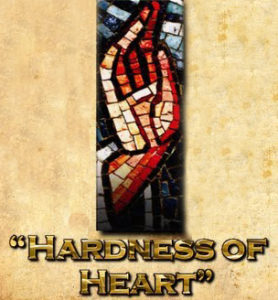
David spoke to Saul: “Let your majesty not lose courage. I am at your service to go and fight this Philistine.”
But Saul answered David, “You cannot go up against this Philistine and fight with him, for you are only a youth, while he has been a warrior from his youth.”
David continued: “The LORD, who delivered me from the claws of the lion and the bear, will also keep me safe from the clutches of this Philistine.” Saul answered David, “Go! the LORD will be with you.”
Then, staff in hand, David selected five smooth stones from the wadi and put them in the pocket of his shepherd’s bag. With his sling also ready to hand, he approached the Philistine.
With his shield-bearer marching before him, the Philistine also advanced closer and closer to David.
When he had sized David up, and seen that he was youthful, and ruddy, and handsome in appearance, he held him in contempt. The Philistine said to David, “Am I a dog that you come against me with a staff?” Then the Philistine cursed David by his gods and said to him, “Come here to me, and I will leave your flesh for the birds of the air and the beasts of the field.” David answered him: “You come against me with sword and spear and scimitar, but I come against you in the name of the LORD of hosts, the God of the armies of Israel that you have insulted. Today the LORD shall deliver you into my hand; I will strike you down and cut off your head. This very day I will leave your corpse and the corpses of the Philistine army for the birds of the air and the beasts of the field; thus the whole land shall learn that Israel has a God.
All this multitude, too, shall learn that it is not by sword or spear that the LORD saves. For the battle is the LORD’S, and he shall deliver you into our hands.”
The Philistine then moved to meet David at close quarters, while David ran quickly toward the battle line in the direction of the Philistine. David put his hand into the bag and took out a stone, hurled it with the sling, and struck the Philistine on the forehead. The stone embedded itself in his brow, and he fell prostrate on the ground. (Thus David overcame the Philistine with sling and stone; he struck the Philistine mortally, and did it without a sword.) Then David ran and stood over him; with the Philistine’s own sword (which he drew from its sheath) he dispatched him and cut off his head.
Jesus entered the synagogue. There was a man there who had a withered hand.
They watched him closely to see if he would cure him on the sabbath so that they might accuse him.
He said to the man with the withered hand, “Come up here before us.”
Then he said to them, “Is it lawful to do good on the sabbath rather than to do evil, to save life rather than to destroy it?” But they remained silent.
Looking around at them with anger and grieved at their hardness of heart, he said to the man, “Stretch out your hand.” He stretched it out and his hand was restored.
The Pharisees went out and immediately took counsel with the Herodians against him to put him to death.
16/1/18 Tuesday of the Second week in Ordinary Time
 First Reading 1st book of Samuel 16:1-13.
First Reading 1st book of Samuel 16:1-13.
The LORD said to Samuel: “How long will you grieve for Saul, whom I have rejected as king of Israel? Fill your horn with oil, and be on your way. I am sending you to Jesse of Bethlehem, for I have chosen my king from among his sons.”
But Samuel replied: “How can I go? Saul will hear of it and kill me.” To this the LORD answered: “Take a heifer along and say, ‘I have come to sacrifice to the LORD.’
Invite Jesse to the sacrifice, and I myself will tell you what to do; you are to anoint for me the one I point out to you.”
Samuel did as the LORD had commanded him. When he entered Bethlehem, the elders of the city came trembling to meet him and inquired, “Is your visit peaceful, O seer?”
He replied: “Yes! I have come to sacrifice to the LORD. So cleanse yourselves and join me today for the banquet.” He also had Jesse and his sons cleanse themselves and invited them to the sacrifice.
As they came, he looked at Eliab and thought, “Surely the LORD’S anointed is here before him.”
But the LORD said to Samuel: “Do not judge from his appearance or from his lofty stature, because I have rejected him. Not as man sees does God see, because man sees the appearance but the LORD looks into the heart.”
Then Jesse called Abinadab and presented him before Samuel, who said, “The Lord has not chosen him.”
Next Jesse presented Shammah, but Samuel said, “The LORD has not chosen this one either.”
In the same way Jesse presented seven sons before Samuel, but Samuel said to Jesse, “The LORD has not chosen any one of these.”
Then Samuel asked Jesse, “Are these all the sons you have?” Jesse replied, “There is still the youngest, who is tending the sheep.” Samuel said to Jesse, “Send for him; we will not begin the sacrificial banquet until he arrives here.”
Jesse sent and had the young man brought to them. He was ruddy, a youth handsome to behold and making a splendid appearance. The LORD said, “There-anoint him, for this is he!”
Then Samuel, with the horn of oil in hand, anointed him in the midst of his brothers; and from that day on, the spirit of the LORD rushed upon David. When Samuel took his leave, he went to Ramah.
Gospel Mark 2:23-28.
As Jesus was passing through a field of grain on the sabbath, his disciples began to make a path while picking the heads of grain.
At this the Pharisees said to him, “Look, why are they doing what is unlawful on the sabbath?”
He said to them, “Have you never read what David did when he was in need and he and his companions were hungry?
How he went into the house of God when Abiathar was high priest and ate the bread of offering that only the priests could lawfully eat, and shared it with his companions?”
Then he said to them, “The sabbath was made for man, not man for the sabbath.
That is why the Son of Man is lord even of the sabbath.”
15/01/18 Monday of the Second week in Ordinary Time
 First Reading 1st book of Samuel 15:16-23.
First Reading 1st book of Samuel 15:16-23.
Samuel said to Saul: “Stop! Let me tell you what the LORD said to me last night.” Saul replied, “Speak!”
Samuel then said: “Though little in your own esteem, are you not leader of the tribes of Israel? The LORD anointed you king of Israel
and sent you on a mission, saying, ‘Go and put the sinful Amalekites under a ban of destruction. Fight against them until you have exterminated them.’
Why then have you disobeyed the LORD? You have pounced on the spoil, thus displeasing the LORD.”
Saul answered Samuel: “I did indeed obey the LORD and fulfill the mission on which the LORD sent me. I have brought back Agag, and I have destroyed Amalek under the ban.
But from the spoil the men took sheep and oxen, the best of what had been banned, to sacrifice to the LORD their God in Gilgal.”
But Samuel said: “Does the LORD so delight in holocausts and sacrifices as in obedience to the command of the LORD? Obedience is better than sacrifice, and submission than the fat of rams.
For a sin like divination is rebellion, and presumption is the crime of idolatry. Because you have rejected the command of the LORD, he, too, has rejected you as ruler.”
Gospel Mark 2:18-22.
The disciples of John and of the Pharisees were accustomed to fast. People came to Jesus and objected, “Why do the disciples of John and the disciples of the Pharisees fast, but your disciples do not fast?”
Jesus answered them, “Can the wedding guests fast while the bridegroom is with them? As long as they have the bridegroom with them they cannot fast.
But the days will come when the bridegroom is taken away from them, and then they will fast on that day.
No one sews a piece of unshrunken cloth on an old cloak. If he does, its fullness pulls away, the new from the old, and the tear gets worse.
Likewise, no one pours new wine into old wineskins. Otherwise, the wine will burst the skins, and both the wine and the skins are ruined. Rather, new wine is poured into fresh wineskins.”
 First Reading 1st book of Samuel 3:3b-10.19.
First Reading 1st book of Samuel 3:3b-10.19.
Samuel was sleeping in the temple of the LORD where the ark of God was.
The LORD called to Samuel, who answered, “Here I am.”
He ran to Eli and said, “Here I am. You called me.” “I did not call you,” Eli said. “Go back to sleep.” So he went back to sleep.
Again the LORD called Samuel, who rose and went to Eli. “Here I am,” he said. “You called me.” But he answered, “I did not call you, my son. Go back to sleep.”
At that time Samuel was not familiar with the LORD, because the LORD had not revealed anything to him as yet.
The LORD called Samuel again, for the third time. Getting up and going to Eli, he said, “Here I am. You called me.” Then Eli understood that the LORD was calling the youth.
So he said to Samuel, “Go to sleep, and if you are called, reply, ‘Speak, LORD, for your servant is listening.'” When Samuel went to sleep in his place,
the LORD came and revealed his presence, calling out as before, “Samuel, Samuel!” Samuel answered, “Speak, for your servant is listening.”
Samuel grew up, and the LORD was with him, not permitting any word of his to be without effect.
Second Reading First Letter to the Corinthians 6:13c-15a.17-20.
Brothers and sisters: The body is not for immorality, but for the Lord, and the Lord is for the body;
God raised the Lord and will also raise us by his power.
Do you not know that your bodies are members of Christ? Shall I then take Christ’s members and make them the members of a prostitute? Of course not!
But whoever is joined to the Lord becomes one spirit with him.
Avoid immorality. Every other sin a person commits is outside the body, but the immoral person sins against his own body.
Do you not know that your body is a temple of the holy Spirit within you, whom you have from God, and that you are not your own?
For you have been purchased at a price. Therefore, glorify God in your body.
Gospel John 1:35-42.
John was standing with two of his disciples,
and as he watched Jesus walk by, he said, “Behold, the Lamb of God.”
The two disciples heard what he said and followed Jesus.
Jesus turned and saw them following him and said to them, “What are you looking for?” They said to him, “Rabbi” (which translated means Teacher), “where are you staying?”
He said to them,”Come, and you will see.” So they went and saw where he was staying, and they stayed with him that day. It was about four in the afternoon.
Andrew, the brother of Simon Peter, was one of the two who heard John and followed Jesus.
He first found his own brother Simon and told him, “We have found the Messiah” (which is translated Anointed).
Then he brought him to Jesus. Jesus looked at him and said, “You are Simon the son of John; you will be called Kephas” (which is translated Peter).
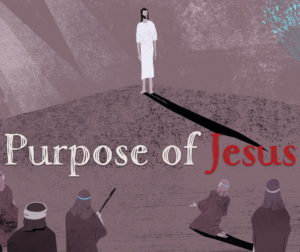
First Reading 1st book of Samuel 9:1-4.17-19.10:1a.
There was a stalwart man from Benjamin named Kish, who was the son of Abiel, son of Zeror, son of Becorath, son of Aphiah, a Benjaminite.
He had a son named Saul, who was a handsome young man. There was no other Israelite handsomer than Saul; he stood head and shoulders above the people.
Now the asses of Saul’s father, Kish, had wandered off. Kish said to his son Saul, “Take one of the servants with you and go out and hunt for the asses.”
Accordingly they went through the hill country of Ephraim, and through the land of Shalishah. Not finding them there, they continued through the land of Shaalim without success. They also went through the land of Benjamin, but they failed to find the animals.
When Samuel caught sight of Saul, the LORD assured him, “This is the man of whom I told you; he is to govern my people.”
Saul met Samuel in the gateway and said, “Please tell me where the seer lives.”
Samuel answered Saul: “I am the seer. Go up ahead of me to the high place and eat with me today. In the morning, before dismissing you, I will tell you whatever you wish.
Then, from a flask he had with him, Samuel poured oil on Saul’s head; he also kissed him, saying: “The LORD anoints you commander over his heritage. You are to govern the LORD’S people Israel, and to save them from the grasp of their enemies round about. “This will be the sign for you that the LORD has anointed you commander over his heritage:
Jesus went out along the sea. All the crowd came to him and he taught them.
As he passed by, he saw Levi, son of Alphaeus, sitting at the customs post. He said to him, “Follow me.” And he got up and followed him.
While he was at table in his house, many tax collectors and sinners sat with Jesus and his disciples; for there were many who followed him.
Some scribes who were Pharisees saw that he was eating with sinners and tax collectors and said to his disciples, “Why does he eat with tax collectors and sinners?”
Jesus heard this and said to them (that), “Those who are well do not need a physician, but the sick do. I did not come to call the righteous but sinners.”
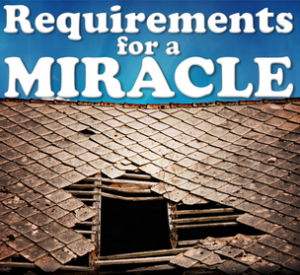
First Reading 1st book of Samuel 8:4-7.10-22a.
All the elders of Israel came in a body to Samuel at Ramah
and said to him, “Now that you are old, and your sons do not follow your example, appoint a king over us, as other nations have, to judge us.”
Samuel was displeased when they asked for a king to judge them. He prayed to the LORD, however,
who said in answer: “Grant the people’s every request. It is not you they reject, they are rejecting me as their king.
Samuel delivered the message of the LORD in full to those who were asking him for a king.
He told them: “The rights of the king who will rule you will be as follows: He will take your sons and assign them to his chariots and horses, and they will run before his chariot.
He will also appoint from among them his commanders of groups of a thousand and of a hundred soldiers. He will set them to do his plowing and his harvesting, and to make his implements of war and the equipment of his chariots.
He will use your daughters as ointment-makers, as cooks, and as bakers.
He will take the best of your fields, vineyards, and olive groves, and give them to his officials.
He will tithe your crops and your vineyards, and give the revenue to his eunuchs and his slaves.
He will take your male and female servants, as well as your best oxen and your asses, and use them to do his work.
He will tithe your flocks and you yourselves will become his slaves.
When this takes place, you will complain against the king whom you have chosen, but on that day the LORD will not answer you.”
The people, however, refused to listen to Samuel’s warning and said, “Not so! There must be a king over us.
We too must be like other nations, with a king to rule us and to lead us in warfare and fight our battles.”
When Samuel had listened to all the people had to say, he repeated it to the LORD,
who then said to him, “Grant their request and appoint a king to rule them.”
When Jesus returned to Capernaum after some days, it became known that he was at home.
Many gathered together so that there was no longer room for them, not even around the door, and he preached the word to them.
They came bringing to him a paralytic carried by four men.
Unable to get near Jesus because of the crowd, they opened up the roof above him. After they had broken through, they let down the mat on which the paralytic was lying.
When Jesus saw their faith, he said to the paralytic, “Child, your sins are forgiven.”
Now some of the scribes were sitting there asking themselves,
Why does this man speak that way? He is blaspheming. Who but God alone can forgive sins?
Jesus immediately knew in his mind what they were thinking to themselves, so he said, “Why are you thinking such things in your hearts?
Which is easier, to say to the paralytic, ‘Your sins are forgiven,’ or to say, ‘Rise, pick up your mat and walk’?
But that you may know that the Son of Man has authority to forgive sins on earth”–
he said to the paralytic, “I say to you, rise, pick up your mat, and go home.”
He rose, picked up his mat at once, and went away in the sight of everyone. They were all astounded and glorified God, saying, “We have never seen anything like this.”
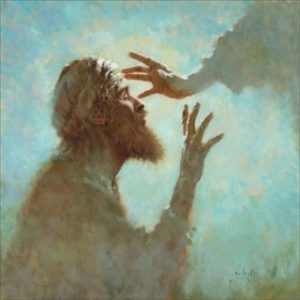 First Reading 1st book of Samuel 4:1-11.
First Reading 1st book of Samuel 4:1-11.
The Philistines gathered for an attack on Israel. Israel went out to engage them in battle and camped at Ebenezer, while the Philistines camped at Aphek.
The Philistines then drew up in battle formation against Israel. After a fierce struggle Israel was defeated by the Philistines, who slew about four thousand men on the battlefield.
When the troops retired to the camp, the elders of Israel said, “Why has the LORD permitted us to be defeated today by the Philistines? Let us fetch the ark of the LORD from Shiloh that it may go into battle among us and save us from the grasp of our enemies.”
So the people sent to Shiloh and brought from there the ark of the LORD of hosts, who is enthroned upon the cherubim. The two sons of Eli, Hophni and Phinehas, were with the ark of God.
When the ark of the LORD arrived in the camp, all Israel shouted so loudly that the earth resounded.
The Philistines, hearing the noise of shouting, asked, “What can this loud shouting in the camp of the Hebrews mean?” On learning that the ark of the LORD had come into the camp,
the Philistines were frightened. They said, “Gods have come to their camp.” They said also, “Woe to us! This has never happened before.
Woe to us! Who can deliver us from the power of these mighty gods? These are the gods that struck the Egyptians with various plagues and with pestilence.
Take courage and be manly, Philistines; otherwise you will become slaves to the Hebrews, as they were your slaves. So fight manfully!”
The Philistines fought and Israel was defeated; every man fled to his own tent. It was a disastrous defeat, in which Israel lost thirty thousand foot soldiers.
The ark of God was captured, and Eli’s two sons, Hophni and Phinehas, were among the dead.
A leper came to him and kneeling down begged him and said, “If you wish, you can make me clean.”
Moved with pity, he stretched out his hand, touched him, and said to him, “I do will it. Be made clean.”
The leprosy left him immediately, and he was made clean.
Then, warning him sternly, he dismissed him at once.
Then he said to him, “See that you tell no one anything, but go, show yourself to the priest and offer for your cleansing what Moses prescribed; that will be proof for them.”
The man went away and began to publicize the whole matter. He spread the report abroad so that it was impossible for Jesus to enter a town openly. He remained outside in deserted places, and people kept coming to him from everywhere.

First Reading 1st book of Samuel 3:1-10.19-20.
During the time young Samuel was minister to the LORD under Eli, a revelation of the LORD was uncommon and vision infrequent.
One day Eli was asleep in his usual place. His eyes had lately grown so weak that he could not see.
The lamp of God was not yet extinguished, and Samuel was sleeping in the temple of the LORD where the ark of God was.
The LORD called to Samuel, who answered, “Here I am.”
He ran to Eli and said, “Here I am. You called me.” “I did not call you,” Eli said. “Go back to sleep.” So he went back to sleep.
Again the LORD called Samuel, who rose and went to Eli. “Here I am,” he said. “You called me.” But he answered, “I did not call you, my son. Go back to sleep.”
At that time Samuel was not familiar with the LORD, because the LORD had not revealed anything to him as yet.
The LORD called Samuel again, for the third time. Getting up and going to Eli, he said, “Here I am. You called me.” Then Eli understood that the LORD was calling the youth.
So he said to Samuel, “Go to sleep, and if you are called, reply, ‘Speak, LORD, for your servant is listening.'” When Samuel went to sleep in his place,
the LORD came and revealed his presence, calling out as before, “Samuel, Samuel!” Samuel answered, “Speak, for your servant is listening.”
Samuel grew up, and the LORD was with him, not permitting any word of his to be without effect.
Thus all Israel from Dan to Beer-sheba came to know that Samuel was an accredited prophet of the LORD.
On leaving the synagogue Jesus entered the house of Simon and Andrew with James and John.
Simon’s mother-in-law lay sick with a fever. They immediately told him about her.
He approached, grasped her hand, and helped her up. Then the fever left her and she waited on them.
When it was evening, after sunset, they brought to him all who were ill or possessed by demons.
The whole town was gathered at the door.
He cured many who were sick with various diseases, and he drove out many demons, not permitting them to speak because they knew him.
Rising very early before dawn, he left and went off to a deserted place, where he prayed.
Simon and those who were with him pursued him
and on finding him said, “Everyone is looking for you.”
He told them, “Let us go on to the nearby villages that I may preach there also. For this purpose have I come.”
So he went into their synagogues, preaching and driving out demons throughout the whole of Galilee.
 First Reading 1st book of Samuel 1:9-20.
First Reading 1st book of Samuel 1:9-20. Hannah rose after a meal at Shiloh, and presented herself before the LORD; at the time, Eli the priest was sitting on a chair near the doorpost of the LORD’s temple.
In her bitterness she prayed to the LORD, weeping copiously,
and she made a vow, promising: “O LORD of hosts, if you look with pity on the misery of your handmaid, if you remember me and do not forget me, if you give your handmaid a male child, I will give him to the LORD for as long as he lives; neither wine nor liquor shall he drink, and no razor shall ever touch his head.”
As she remained long at prayer before the LORD, Eli watched her mouth,
for Hannah was praying silently; though her lips were moving, her voice could not be heard. Eli, thinking her drunk,
said to her, “How long will you make a drunken show of yourself? Sober up from your wine!”
“It isn’t that, my lord,” Hannah answered. “I am an unhappy woman. I have had neither wine nor liquor; I was only pouring out my troubles to the LORD.
Do not think your handmaid a ne’er-do-well; my prayer has been prompted by my deep sorrow and misery.”
Eli said, “Go in peace, and may the God of Israel grant you what you have asked of him.”
She replied, “Think kindly of your maidservant,” and left. She went to her quarters, ate and drank with her husband, and no longer appeared downcast.
Early the next morning they worshiped before the LORD, and then returned to their home in Ramah. When Elkanah had relations with his wife Hannah, the LORD remembered her.
She conceived, and at the end of her term bore a son whom she called Samuel, since she had asked the LORD for him.
Jesus came to Capernaum with his followers, and on the sabbath he entered the synagogue and taught.
The people were astonished at his teaching, for he taught them as one having authority and not as the scribes.
In their synagogue was a man with an unclean spirit;
he cried out, “What have you to do with us, Jesus of Nazareth? Have you come to destroy us? I know who you are–the Holy One of God!”
Jesus rebuked him and said, “Quiet! Come out of him!”
The unclean spirit convulsed him and with a loud cry came out of him.
All were amazed and asked one another, “What is this? A new teaching with authority. He commands even the unclean spirits and they obey him.”
His fame spread everywhere throughout the whole region of Galilee.
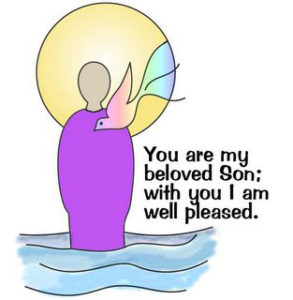 First Reading Isaiah 55:1-11.
First Reading Isaiah 55:1-11.
Thus says the LORD: All you who are thirsty, come to the water! You who have no money, come, receive grain and eat; come, without paying and without cost, drink wine and milk!
Why spend your money for what is not bread; your wages for what fails to satisfy? Heed me, and you shall eat well, you shall delight in rich fare.
Come to me heedfully, listen, that you may have life. I will renew with you the everlasting covenant, the benefits assured to David.
As I made him a witness to the peoples, a leader and commander of nations,
So shall you summon a nation you knew not, and nations that knew you not shall run to you, Because of the LORD, your God, the Holy One of Israel, who has glorified you.
Seek the LORD while he may be found, call him while he is near.
Let the scoundrel forsake his way, and the wicked man his thoughts; Let him turn to the LORD for mercy; to our God, who is generous in forgiving.
For my thoughts are not your thoughts, nor are your ways my ways, says the LORD.
As high as the heavens are above the earth, so high are my ways above your ways and my thoughts above your thoughts.
For just as from the heavens the rain and snow come down And do not return there till they have watered the earth, making it fertile and fruitful, Giving seed to him who sows and bread to him who eats,
So shall my word be that goes forth from my mouth; It shall not return to me void, but shall do my will, achieving the end for which I sent it.
This is what John the Baptist proclaimed: “One mightier than I is coming after me. I am not worthy to stoop and loosen the thongs of his sandals.
I have baptized you with water; he will baptize you with the holy Spirit.”
It happened in those days that Jesus came from Nazareth of Galilee and was baptized in the Jordan by John.
On coming up out of the water he saw the heavens being torn open and the Spirit, like a dove, descending upon him.
And a voice came from the heavens, “You are my beloved Son; with you I am well pleased.”
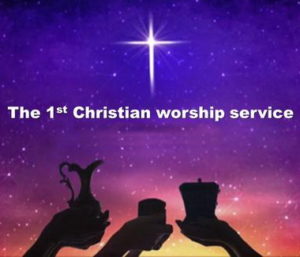
First Reading Book of Isaiah 60:1-6.
Rise up in splendor, Jerusalem! Your light has come, the glory of the Lord shines upon you.
See, darkness covers the earth, and thick clouds cover the peoples; But upon you the LORD shines, and over you appears his glory.
Nations shall walk by your light, and kings by your shining radiance.
Raise your eyes and look about; they all gather and come to you: Your sons come from afar, and your daughters in the arms of their nurses.
Then you shall be radiant at what you see, your heart shall throb and overflow, For the riches of the sea shall be emptied out before you, the wealth of nations shall be brought to you.
Caravans of camels shall fill you, dromedaries from Midian and Ephah; All from Sheba shall come bearing gold and frankincense, and proclaiming the praises of the LORD.
Brothers and sisters: You have heard of the stewardship of God’s grace that was given to me for your benefit,
(namely, that) the mystery was made known to me by revelation, as I have written briefly earlier.
which was not made known to human beings in other generations as it has now been revealed to his holy apostles and prophets by the Spirit,
that the Gentiles are coheirs, members of the same body, and copartners in the promise in Christ Jesus through the gospel.
When Jesus was born in Bethlehem of Judea, in the days of King Herod, behold, magi from the east arrived in Jerusalem,
saying, “Where is the newborn king of the Jews? We saw his star at its rising and have come to do him homage.”
When King Herod heard this, he was greatly troubled, and all Jerusalem with him.
Assembling all the chief priests and the scribes of the people, he inquired of them where the Messiah was to be born.
They said to him, “In Bethlehem of Judea, for thus it has been written through the prophet:
‘And you, Bethlehem, land of Judah, are by no means least among the rulers of Judah; since from you shall come a ruler, who is to shepherd my people Israel.'”
Then Herod called the magi secretly and ascertained from them the time of the star’s appearance.
He sent them to Bethlehem and said, “Go and search diligently for the child. When you have found him, bring me word, that I too may go and do him homage.”
After their audience with the king they set out. And behold, the star that they had seen at its rising preceded them, until it came and stopped over the place where the child was.
They were overjoyed at seeing the star,
and on entering the house they saw the child with Mary his mother. They prostrated themselves and did him homage. Then they opened their treasures and offered him gifts of gold, frankincense, and myrrh.
And having been warned in a dream not to return to Herod, they departed for their country by another way.
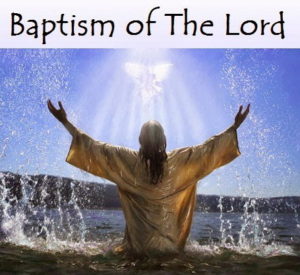 First Reading First Letter of John 5:5-13.
First Reading First Letter of John 5:5-13. Beloved: Who indeed is the victor over the world but the one who believes that Jesus is the Son of God?
This is the one who came through water and blood, Jesus Christ, not by water alone, but by water and blood. The Spirit is the one that testifies, and the Spirit is truth.
So there are three that testify,
the Spirit, the water, and the blood, and the three are of one accord.
If we accept human testimony, the testimony of God is surely greater. Now the testimony of God is this, that he has testified on behalf of his Son.
Whoever believes in the Son of God has this testimony within himself. Whoever does not believe God has made him a liar by not believing the testimony God has given about his Son.
And this is the testimony: God gave us eternal life, and this life is in his Son.
Whoever possesses the Son has life; whoever does not possess the Son of God does not have life.
I write these things to you so that you may know that you have eternal life, you who believe in the name of the Son of God.
In the course of his preaching he said, ‘After me is coming someone who is more powerful than me, and I am not fit to kneel down and undo the strap of his sandals.
I have baptised you with water, but he will baptise you with the Holy Spirit.’
It was at this time that Jesus came from Nazareth in Galilee and was baptised in the Jordan by John.
And at once, as he was coming up out of the water, he saw the heavens torn apart and the Spirit, like a dove, descending on him.
And a voice came from heaven, ‘You are my Son, the Beloved; my favour rests on you.’
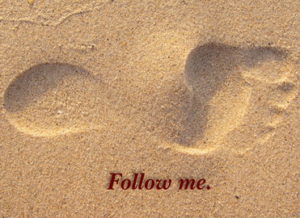 First Reading First Letter of John 3:11-21.
First Reading First Letter of John 3:11-21. Beloved: This is the message you have heard from the beginning: we should love one another,
unlike Cain who belonged to the evil one and slaughtered his brother. Why did he slaughter him? Because his own works were evil, and those of his brother righteous.
Do not be amazed, (then,) brothers, if the world hates you.
We know that we have passed from death to life because we love our brothers. Whoever does not love remains in death.
Everyone who hates his brother is a murderer, and you know that no murderer has eternal life remaining in him.
The way we came to know love was that he laid down his life for us; so we ought to lay down our lives for our brothers.
If someone who has worldly means sees a brother in need and refuses him compassion, how can the love of God remain in him?
Children, let us love not in word or speech but in deed and truth.
(Now) this is how we shall know that we belong to the truth and reassure our hearts before him
in whatever our hearts condemn, for God is greater than our hearts and knows everything.
Beloved, if (our) hearts do not condemn us, we have confidence in God
Jesus decided to go to Galilee, and he found Philip. And Jesus said to him, “Follow me.”
Now Philip was from Bethsaida, the town of Andrew and Peter.
Philip found Nathanael and told him, “We have found the one about whom Moses wrote in the law, and also the prophets, Jesus, son of Joseph, from Nazareth.”
But Nathanael said to him, “Can anything good come from Nazareth?” Philip said to him, “Come and see.”
Jesus saw Nathanael coming toward him and said of him, “Here is a true Israelite. There is no duplicity in him.”
Nathanael said to him, “How do you know me?” Jesus answered and said to him, “Before Philip called you, I saw you under the fig tree.”
Nathanael answered him, “Rabbi, you are the Son of God; you are the King of Israel.”
Jesus answered and said to him, “Do you believe because I told you that I saw you under the fig tree? You will see greater things than this.”
And he said to him, “Amen, amen, I say to you, you will see the sky opened and the angels of God ascending and descending on the Son of Man.”

Children, let no one deceive you. The person who acts in righteousness is righteous, just as he is righteous.
Whoever sins belongs to the devil, because the devil has sinned from the beginning. Indeed, the Son of God was revealed to destroy the works of the devil.
No one who is begotten by God commits sin, because God’s seed remains in him; he cannot sin because he is begotten by God.
In this way, the children of God and the children of the devil are made plain; no one who fails to act in righteousness belongs to God, nor anyone who does not love his brother.
John was standing with two of his disciples,
and as he watched Jesus walk by, he said, “Behold, the Lamb of God.”
The two disciples heard what he said and followed Jesus.
Jesus turned and saw them following him and said to them, “What are you looking for?” They said to him, “Rabbi” (which translated means Teacher), “where are you staying?”
He said to them,”Come, and you will see.” So they went and saw where he was staying, and they stayed with him that day. It was about four in the afternoon.
Andrew, the brother of Simon Peter, was one of the two who heard John and followed Jesus.
He first found his own brother Simon and told him, “We have found the Messiah” (which is translated Anointed).
Then he brought him to Jesus. Jesus looked at him and said, “You are Simon the son of John; you will be called Kephas” (which is translated Peter).

If you consider that God is righteous, you also know that everyone who acts in righteousness is begotten by him.
See what love the Father has bestowed on us that we may be called the children of God. Yet so we are. The reason the world does not know us is that it did not know him.
Beloved, we are God’s children now; what we shall be has not yet been revealed. We do know that when it is revealed we shall be like him, for we shall see him as he is.
Everyone who has this hope based on him makes himself pure, as he is pure.
Everyone who commits sin commits lawlessness, for sin is lawlessness.
You know that he was revealed to take away sins, and in him there is no sin.
No one who remains in him sins; no one who sins has seen him or known him.
John the Baptist saw Jesus coming toward him and said, “Behold, the Lamb of God, who takes away the sin of the world.
He is the one of whom I said, ‘A man is coming after me who ranks ahead of me because he existed before me.’
I did not know him, but the reason why I came baptizing with water was that he might be made known to Israel.”
John testified further, saying, “I saw the Spirit come down like a dove from the sky and remain upon him.
I did not know him, but the one who sent me to baptize with water told me, ‘On whomever you see the Spirit come down and remain, he is the one who will baptize with the holy Spirit.’
Now I have seen and testified that he is the Son of God.”

Beloved: Who is the liar? Whoever denies that Jesus is the Christ. Whoever denies the Father and the Son, this is the antichrist.
No one who denies the Son has the Father, but whoever confesses the Son has the Father as well.
Let what you heard from the beginning remain in you. If what you heard from the beginning remains in you, then you will remain in the Son and in the Father.
And this is the promise that he made us: eternal life.
I write you these things about those who would deceive you.
As for you, the anointing that you received from him remains in you, so that you do not need anyone to teach you. But his anointing teaches you about everything and is true and not false; just as it taught you, remain in him. And now, children, remain in him, so that when he appears we may have confidence and not be put to shame by him at his coming.
This is the testimony of John. When the Jews from Jerusalem sent priests and Levites to him to ask him, “Who are you?”
he admitted and did not deny it, but admitted, “I am not the Messiah.”
So they asked him, “What are you then? Are you Elijah?” And he said, “I am not.” “Are you the Prophet?” He answered, “No.” So they said to him, “Who are you, so we can give an answer to those who sent us? What do you have to say for yourself?” He said: “I am ‘the voice of one crying out in the desert, “Make straight the way of the Lord,”‘ as Isaiah the prophet said.” Some Pharisees were also sent.
They asked him, “Why then do you baptize if you are not the Messiah or Elijah or the Prophet?”
John answered them, “I baptize with water; but there is one among you whom you do not recognize,
the one who is coming after me, whose sandal strap I am not worthy to untie.”
This happened in Bethany across the Jordan, where John was baptizing.
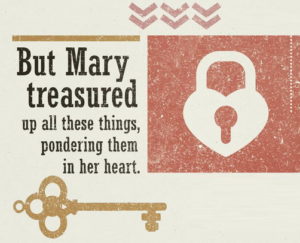 First Reading Book of Numbers 6:22-27.
First Reading Book of Numbers 6:22-27.
The LORD said to Moses :
“Speak to Aaron and his sons and tell them: This is how you shall bless the Israelites. Say to them:
The LORD bless you and keep you!
The LORD let his face shine upon you, and be gracious to you!
The LORD look upon you kindly and give you peace!
So shall they invoke my name upon the Israelites, and I will bless them.”
Second Reading Galatians 4:4-7.
Brothers and sisters: When the fullness of time had come, God sent his Son, born of a woman, born under the law,
to ransom those under the law, so that we might receive adoption.
As proof that you are children, God sent the spirit of his Son into our hearts, crying out, “Abba, Father!”
So you are no longer a slave but a child, and if a child then also an heir, through God.
The shepherds went in haste to Bethlehem and found Mary and Joseph, and the infant lying in the manger.
When they saw this, they made known the message that had been told them about this child.
All who heard it were amazed by what had been told them by the shepherds.
And Mary kept all these things, reflecting on them in her heart.
Then the shepherds returned, glorifying and praising God for all they had heard and seen, just as it had been told to them.
When eight days were completed for his circumcision, he was named Jesus, the name given him by the angel before he was conceived in the womb.
